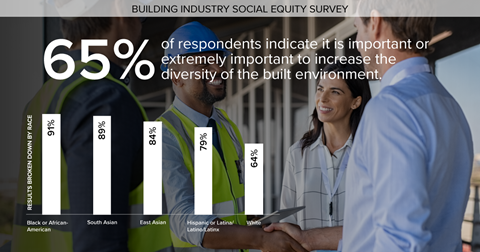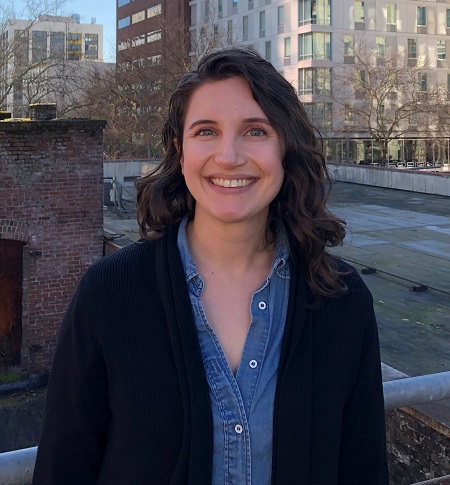We recognize there are structural injustices and inequities in our systems and climate work. NBI is committed to the journey necessary to ensure every member of our society has equal access to and benefits from zero energy and zero carbon. This means we must partner with people of color and low-income communities in achieving ambitious energy efficiency and carbon reduction goals.
— NBI Diversity Statement, adopted by the Board of Directors in July 2021
Over the last 18 months, heightened awareness about the inequities and injustices experienced by low-income and communities of color prompted NBI, like many other organizations, to reflect on our corporate practices and see where we have blind spots. Much of our work to date has been guided by a commitment to learn and increase our awareness and understanding about the history of inequities in our industry and how our individual conscious and unconscious bias might impact our work environment and the populations we serve.
Through a collaborative process between the NBI staff and board of directors, we recently adopted our first Equity, Diversity, and Inclusion (EDI) Statement to help guide our work going forward. This statement is a formal recognition that solving complex problems such as the climate crisis requires solutions developed collaboratively with the communities we’re serving. For our organization, this starts with our own staff and board, but it extends to the building industry as a whole.

Earlier this year, the National Institute of Buildings Sciences (NIBS) launched the Built Environment Social Equity Survey to collect critical data on the workforce of the built environment to inform future initiatives on social equity. The survey was distributed among the members and stakeholders of 18 industry organizations, including NBI, resulting in nearly 12,000 respondents. With nearly three-quarters of respondents identifying as white, 65% indicated it is important or extremely important to increase diversity in the building industry.
“The built environment needs a workforce and culture transformation, and this survey is just the first step to establish baseline data and set actionable goals,” said Lakisha A. Woods, CAE, President and CEO of NIBS.
Starting where you are on EDI
The lack of racial diversity within the green building and clean energy industries as a whole is reflected in our own organization—something we have a strong desire to change. We made changes to attract a more diverse pool of applicants when hiring and recruiting new board members, including using new channels to promote job openings and conducting “blind” resume reviews (stripping identifying information from resumes is known to reduce bias in recruiting).
In 2020, we joined the Roger Arliner Young (RAY) Diversity Fellowship, which focuses on increasing opportunities for people of color to learn about, engage with, and enter the conservation and clean energy non-government organization (NGO) sectors. Our first RAY Fellow, Maurissa Brown, joined NBI in 2020. A recent graduate of UCLA, Maurissa has worked on a wide range of projects and is interested in studying the intersection of clean energy, health, and equity.
NBI recruited and welcomed four new board members over the last year, including four women of color who are all luminaries in the green building and clean energy industries. They include Corrine Van-Hook Turner, Director of Climate Innovation at Movement Strategy Center; Kathryn Wright, Program Director for Buildings for the Urban Sustainability Directors Network (USDN); Kimi Narita, Senior Strategic Advisor, American Cities Climate Challenge at Natural Resources Defense Council; and Bing Liu, Business Sector Manager with the Pacific Northwest National Laboratory. Their unique backgrounds and experiences have enriched board discussions and decision-making, and pushed us to think differently about our programs and our overall approach to this work.
Meanwhile, NBI staff has participated in a number of Diversity, Equity, and Inclusion (DEI) trainings over the last year, which will continue into 2022.
EDI in workforce development and programs deployment
The transition to a carbon-free economy has the potential to mitigate health and environmental risks caused by fossil fuel-based power while also reducing energy burdens. The $3.5 trillion infrastructure proposal making its way through Congress could generate millions of new jobs in the building and clean energy sectors. In 2019, clean energy jobs paid 25% more than the national median wage; workers in the clean energy sector earned a median hourly wage of $23.89 compared to the national median wage of $19.14, according to the U.S. Department of Energy.
 In our sector, we need to ensure students of color have the knowledge, resources, and relationships to succeed, and have the opportunity to hold leadership roles and make high-level decisions. In 2019, with support from key sponsors and supporters, NBI launched Next Gen, a cohort-model professional development program for undergraduate students who are interested in careers in energy efficiency and carbon neutral buildings. The six-month program, which is completely free to the participants, provides opportunities for advanced learning, resume building, mentorship, networking, and more. The first cohort includes 20 students, 80% of which are women and 80% are students of color. Based on demand, we are hoping to grow the program to serve more students next year.
In our sector, we need to ensure students of color have the knowledge, resources, and relationships to succeed, and have the opportunity to hold leadership roles and make high-level decisions. In 2019, with support from key sponsors and supporters, NBI launched Next Gen, a cohort-model professional development program for undergraduate students who are interested in careers in energy efficiency and carbon neutral buildings. The six-month program, which is completely free to the participants, provides opportunities for advanced learning, resume building, mentorship, networking, and more. The first cohort includes 20 students, 80% of which are women and 80% are students of color. Based on demand, we are hoping to grow the program to serve more students next year.
A roadmap forward
Our EDI committee, which is composed of staff and board members, has played a huge role in guiding our efforts and holding NBI accountable for putting actions behind our words. In the coming months, this committee will be developing a roadmap that will include concrete goals and actions we will take to realize the full potential of the vision laid out by our EDI Statement. As with any roadmap we create, it will include metrics by which we can measure impact.
We are encouraged by discussions happening at all levels—from Congress to state government to boardrooms of Fortune 500 companies and utilities. This fall, many of us will come together at the 2021 Getting to Zero Forum in New York City, where numerous sessions include discussions about ensuring clean energy investment is directed toward disadvantaged households, which often have a higher energy burden. Likewise, we’re excited to see that workforce development programs for better-wage clean energy jobs are prioritizing recruitment of more diverse representation in labor.
We recognize this work is long overdue and we are just in the early stages. We are committed to continuing to make meaningful changes in our own organization as well as work collaboratively with the communities we serve to ensure people, regardless of zip code, experience the benefits of our work equally.
by Leada Fuller-Marashi, Events and Partnerships Manager
Bio
Did you enjoy this content? Consider supporting NBI’s work with a donation today.
